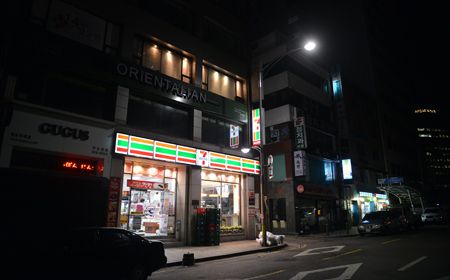
24-hour shops multiplying at rapid rate but that doesn’t mean their business is thriving
These are dreadful times for small businesses but convenience stores seem to be defying the odds as they begin to cover Korean streets like a blanket. Still, it’s debatable whether thriving is the right word to describe the increase in 7-Elevens and CUs, formerly Family Mart, when storeowners aren’t exactly buried in money.
There were about 20,500 of these 24-hour retailers in the country at the end of June, after 1,400 new outlets were added in the first six months of the year, industry figures show. Major franchises have been locked in an aggressive competition to expand their networks and it’s not uncommon to see stores of the same brand cannibalizing each other on the same block.
The combined revenue of convenience stores was 4.79 trillion won (about $4.3 billion) during the January-June period, up 20.5 percent year-on-year, according to Statistics Korea. The increase was accompanied by sharp pullbacks in the sales growth of department stores and mega-discount chains like E-mart and Home plus.
The market for convenience stores has been growing from 13 to 15 percent every year since 2008, when Lehman Brothers collapsed and sent the world into a state of economic muckiness that is still persisting.
The downturn has shed a massive chunk of the economically-active population from the labor market and forced millions of people to start businesses out of necessity. The problem is that the lack of jobs also means that incomes are stagnated and consumption remains poor, meaning not every corner stands a fighting chance for survival.
A recent study by the KB Financial Group showed that nearly half of self-employed businesses derail within three years and more than 75 percent of them fail to last a decade.
For those on the slippery slope of self-employment, convenience stores seem to be a safer choice than fried chicken pubs or coffee shops. The failure rates of these stores has settled in the low-40s in recent years, industry officials say, which is obviously far from pretty but still meaningfully better than other businesses occupied by cast-off workers.
There clearly is an advantage for running a franchised shop with corporate headquarters managing the marketing and controlling inventory and supply. Market observers also say that convenience stores are well positioned to exploit changing consumption patterns in the subduing economy and the rise in micro-families, with just one child or none and more people living alone.
“With the economic difficulties prolonging, people are looking to spend less. That’s why packaged lunches sold at convenience stores are becoming very popular. The rise in people living alone or childless couples, who are less likely to go through the fuss of cooking a big meal, are a boon for convenience stores as well,’’ said a spokesman from one of the convenience store franchises.
It could also be argued that the comparatively low failure rate of convenience stores has much to do with the lopsided business relations between franchise operators and storeowners.
Officials at the headquarters of the franchises are reluctant to talk about the details of their contracts with storeowners. However, storeowners say that a typical contract usually lasts for five years and requires them to pay at least an entire year’s worth of “royalties’’ to opt out of the deal.
“Many storeowners are forced to keep their shops open although they are failing to make money from them simply because they can’t afford the cost of closing it,’’ said one convenience store owner in Donamdong, Seoul.
“So let’s say you terminate your contract with the convenience store franchise after paying a hefty sum and try to recoup it by running your own neighborhood supermarket. The franchise will open another store just nearby to deprive your supermarket of a fighting chance. It’s just like the old Korean saying, you are crying but also forced to swallow the next spoonful of mustard.’’
About 30 percent of Korea’s economically-active population are self-employed, a significantly higher number than any other industrialized nation. And nearly 60 percent of these small shop owners fail to earn more than 1 million won a month.
A recent report by the Global Entrepreneurship Monitor showed that Korea had by far the largest proportion among developed economies of people starting a business out of necessity last year, as opposed to trying out a new idea or innovation, at over 40 percent. This could be regarded as a clear-cut indicator of economic hardship and inequality.
Ireland came in a distant second at around 30 percent. <The Korea Times/Kim Tong-hyung>



